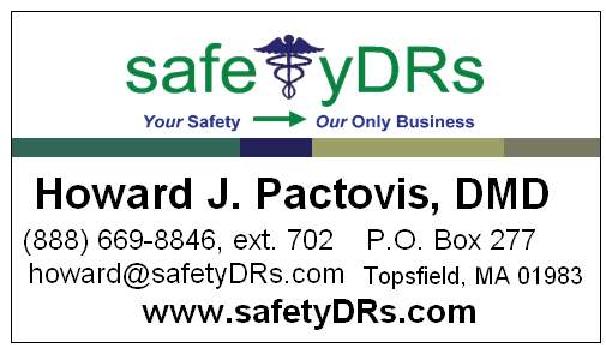
The dental office is a complex array of spaces. Included amongst these are patient treatment areas, laboratory areas, sterilization areas, business and reception areas. In most cases all of these areas have electrical outlets and hence fall under the OSHA electrical safety standard. It is mandated that all plugs and switches have the appropriate covers. These covers must be intact without any obvious cracks or breakage.
The plug at the right and variations of it are seen regularly in the dental office inspection by Dynamic Dental Safety. If this is visible in your office it might lead to serious injury of an employee or a patient. Conduct a self audit safety inspection on at least a monthly basis and empower employees and patients to give suggestions as to how to improve the status and safety of the dental facility.
This plug in addition to missing the plate cover for safety, is also missing the GFCI protector since it is in a wet/damp area.
Some of OSHA's concerns for safety in the dental office are highlighted in red as well as some other safe practices outside of the dental office:
- Assume that all overhead wires are energized at lethal voltages.
- Never assume that a wire is safe to touch even if it is down or appears to be insulated.
- Never touch a fallen overhead power line. Call the electric utility company to report fallen electrical lines.
- Stay at least 10 feet (3 meters) away from overhead wires during cleanup and other activities.
- If working at heights or handling long objects, survey the area before starting work for the presence of overhead wires.
- If an overhead wire falls across your vehicle while you are driving, stay inside the vehicle and continue to drive away from the line. If the engine stalls, do not leave your vehicle. Warn people not to touch the vehicle or the wire. Call or ask someone to call the local electric utility company and emergency services.
- Never operate electrical equipment while you are standing in water.
- Never repair electrical cords or equipment unless qualified and authorized.
- Have a qualified electrician inspect electrical equipment that has gotten wet before energizing it.
- If working in damp locations, inspect electric cords and equipment to ensure that they are in good condition and free of defects, and use a ground-fault circuit interrupter (GFCI).
- Always use caution when working near electricity.
As always feel free to contact Dynamic Dental Safety for your compliance needs at blog@dynamicdentalsafety.com or (888) 669-8846 ext. 701 to order any of our dental safety related materials.
